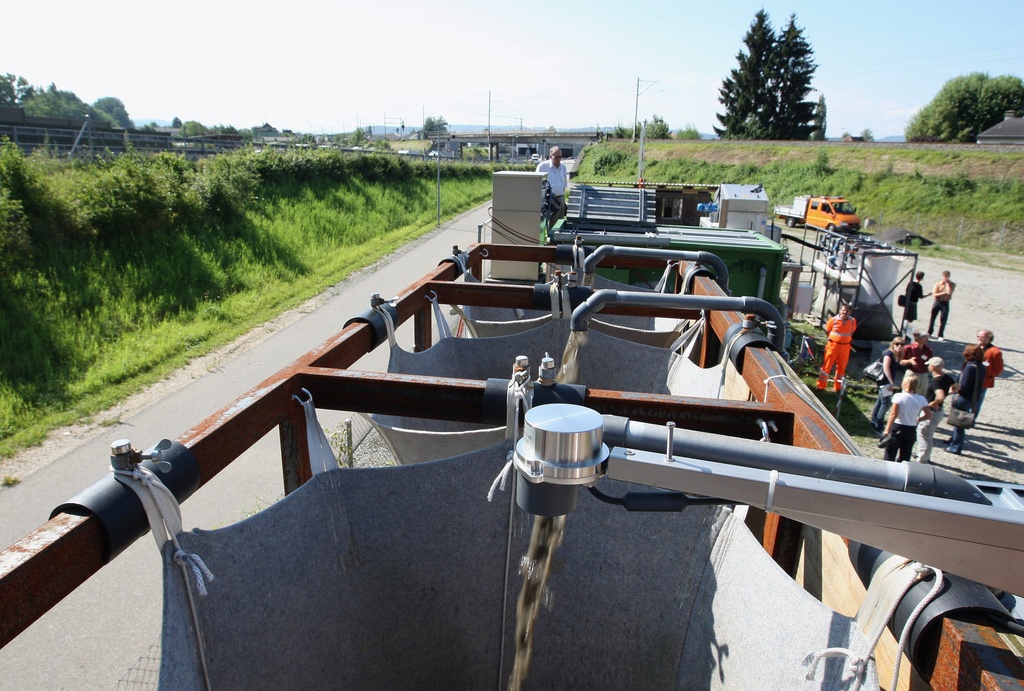
Cleantech business faces dirty practices

The cleantech sector is booming, worth up to SFr20 billion ($22.5 billion) in Switzerland alone. But in some areas practices need to be improved, insiders say.
According to Joachim Esser, just one of the many people working in the cleantech business, stricter criteria need to be enforced and patents in the field offered better protection.
“Cleantech isn’t just about solar cells and windmills, or projects in the desert or publicly traded firms such as Oerlikon Solar,” Esser told swissinfo.ch. “There are also many mid-sized companies and suppliers who are busy in this sector.”
Esser’s company for example is active in sustainable sewage and hoisting technology.
“The materials we use must be recyclable as humans need too much in the way of resources at the moment,” he added. “Only if the industrial sector focuses on sustainable production will we survive.”
Cleantech usually describes products and processes as well as services that improve efficiency and help reduce reliance on natural resources, cut energy use and reduce waste and pollution.
Revenue in the cleantech sector is estimated to be around SFr20 billion in Switzerland, or the equivalent of three to four per cent of gross domestic product, employing approximately 160,000 people.
Lack of awareness
According to Esser, Swiss suppliers can command prices up to 20 per cent higher than their foreign competitors thanks to the quality of their products and their positive image.
But public opinion is ill informed of the importance of Switzerland’s cleantech sector.
“Everyone knows about carbon dioxide pollution from vehicles and aircraft, but few realise for example that making cement is responsible for three to five per cent of the world’s CO2 emissions,” he points out. “Or that a ten-centimetre thick wooden wall offers the same insulation properties as a 1.5-metre concrete wall.”
Esser says the potential for niche markets goes unnoticed by the public. “Who knows for example that 80 tons of tyre rubber ends up spread over one kilometre of motorway near Zurich every year,” he explains.
“Most of it is washed away with rainwater and heads down the drain, with the smaller particles escaping all attempts to filter it.”
That heavy metals and other toxic substances make their way into the ground around major building sites is also a little known fact.
“Switzerland is a leader in cleaning up pollution at these sites,” said Esser. Swiss legislation demands that water treatment be included as part of any building permit authorisation, which is not the case in many other parts of Europe.
Investors have been paying closer attention to the cleantech sector over the past few years. “Many businesspeople like to describe themselves as cleantech entrepreneurs to help raise cash,” added Esser.
“But for start-ups, money is still hard to come by. It’s only when they are up and running that funds are much easier to obtain.”
Patent infringement
However Switzerland’s leadership in the sector could be under threat due to a lack of protection of patents, mainly because the products they cover are easy to copy.
“A large company can take a smaller firm’s innovative product apart and then build it in bigger volumes at cheaper prices,” said Esser. “And it can hope that the smaller company won’t defend its patent because it won’t spend money on hiring lawyers who always demand a retainer.”
Firms also face another dilemma if their patent protects them in Switzerland and Europe, but not elsewhere.
“I have noticed for example lots of clicks from China on my website,“ said Esser. “There is obviously a lot of Chinese interest in my products, but I will never find out, or only much later, if companies over there have copied my ideas.”
Sustainable resource management
Preservation of resources
Emissions reduction
Renewable energy and materials
Efficient energy systems and applications
Sustainable mobility
According to the Cleantech Switzerland export platform, the sector employs around 160,000 people domestically.
Its value is estimated to be around SFr18 to 20 billion, or 3.5 per cent of the Gross Domestic Product.
38 per cent of the sector’s firms export goods and services, versus just over 12 per cent of all Swiss companies.
62 per cent of those exports are destined for Europe.
A 2009 survey found that 78 per cent of the 200 businesses contacted have their own research department and nearly half work with publically-funded research institutes.
(Adapted from German by Scott Capper)

In compliance with the JTI standards
More: SWI swissinfo.ch certified by the Journalism Trust Initiative





























You can find an overview of ongoing debates with our journalists here . Please join us!
If you want to start a conversation about a topic raised in this article or want to report factual errors, email us at english@swissinfo.ch.